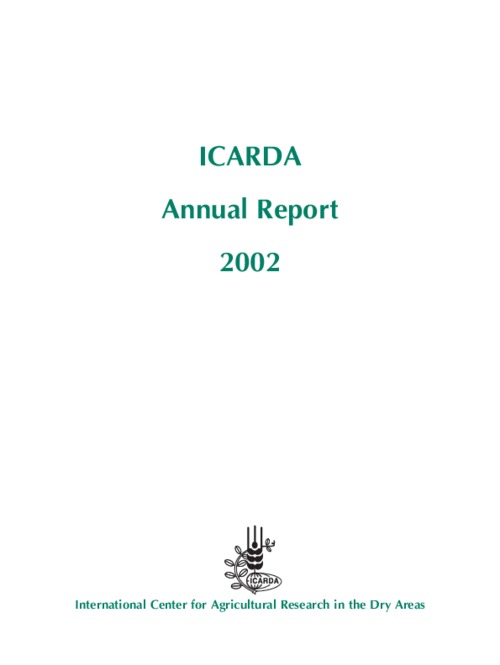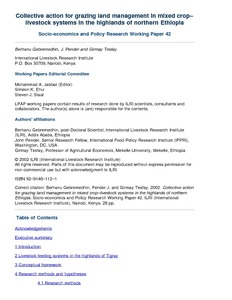Développement Local et Aménagement des Terres Pour un Programme National de Sécurité Alimentaire et de Gestion des Ressources Naturelles, Haïti. Conclusions et recommandations du projet.
AHI program brief
The African Highlands Initiative works to enhance livelihoods and reverse natural resource degradation
through the development of innovative methods,practices,policies and approaches.
Land Law (No. 04/NA).
This Law makes provision for the management and use of various types of land, including forestry and agricultural land.Land of Lao PDR shall be under the ownership of the national community and all organizations and individuals shall have the obligation to protect land to ensure that there is no soil erosion, land subsidence and soil degradation.The Ministry of Agriculture and Forestry shall be in charge of managing agricultural land, forest land, submerged land, river banks, islands and recovered land.The Law, among other things, further provides for the following: land registration for th
ICARDA Annual Report 2002
The year 2002 marked ICARDA's 25th anniversary, and coincided with several honors and awards for the center's excellence in research. Research on developing high-yielding kabuli chickpea varieties that thrive in cool, wet winter conditions earned the 2002 King Baudouin Award of the Consultative Group on International Agricultural Research (CGIAR), jointly with the International Crops Research Institute for the Semi-Arid Tropics (ICRISAT), which focuses on desi chickpea.
Law No. 742-IV “On smallholding”.
This Law defines the legal, organizational, economic and social principles of conducting smallholding activity. Smallholding (individual peasant farm) shall be a business activity that is carried out without the creation of a legal entity by an individual or by family members or relatives that live together in order to meet their personal needs through the production, processing and consumption of agricultural products, vending of its surpluses and the provision of services using the property of a private peasant farm, also in the field of rural green tourism.
The Impact of the confiscation of Land, Labor, Capital Assets and forced relocation in Burma by the military regime
1. Introduction 1;
2. Historical Context and Current Implications of the State Taking Control
of People, Land and Livelihood 2;
2.1. Under the Democratically Elected Government 2;
2.1.1. The Land Nationalization Act 1953 2;
2.1.2. The Agricultural Lands Act 1953 2;
3. Under the Revolutionary Council (1962-1974) 2;
3.1. The Tenancy Act 1963 3;
3.2. The Protection of the Right of Cultivation Act, 1963 3;
4. The State Gains Further Control over the Livelihoods of Households 3;
Decreto Nº 3.609 - Programa de riego y recuperación de tierras degradadas (Libro III, Título XXI del Texto Unificado de la Legislación Secundaria del Ministerio de Agricultura y Ganadería).
El presente Decreto crea el Programa de riego y recuperación de tierras degradadas, adscrito al Ministerio de Agricultura y Ganadería (MAG), cuyos objetivos son el fortalecimiento e inversión en los siguientes ámbitos: 1) Optimización de uso del agua, especialmente la destinada para riego; 2) Reactivación de las economías de los pequeños agricultores; 3) Generación de empleo; 4) Garantizar la seguridad alimentaria interna del país; 5) Lograr mayor estabilidad socioeconómica en las zonas rurales, disminuyendo el crecimiento acelerado de los centros urbanos; y, 6) Armonizar el desarrollo urba
Agroforestry systems for food and nutrition security: potentials, pathways and policy research needs
Analysis of enset (Ensete ventricosum) indigenous production methods and farm-based biodiversity in major enset-growing regions of Southern Ethiopia
Enset (Ensete ventricosum) production is declining, and it faces genetic erosion due to drought, diseases and population pressure. Participatory Rural Appraisal (PRA) and additional formal survey studies on 315 households were conducted over three consecutive years (1998–2000) in the Sidama, Wolaita and Hadiya ethnic regions of southern Ethiopia to assess traditional cultivation methods, analyse the production systems, and evaluate farm-based enset biodiversity. The regions differ in terms of cultural background, resources, farming systems, population density, and agro-ecology.
Carbon sequestration in dryland ecosystems of West Asia and North Africa
The West Asia–North Africa (WANA) region has a land area of 1.7 billion ha, and a population of 600 million. Desertification and soil degradation are severe problems in the region. The problem of drought stress is exacerbated by low and erratic rainfall and soils of limited available water holding capacity and soil organic carbon (SOC) content of less than 0.5 per cent. The SOC pool of most soils has been depleted by soil degradation and widespread use of subsistence and exploitative farming systems.







